The Twelve Minor Prophets - Lesson 1
Chris Knepp
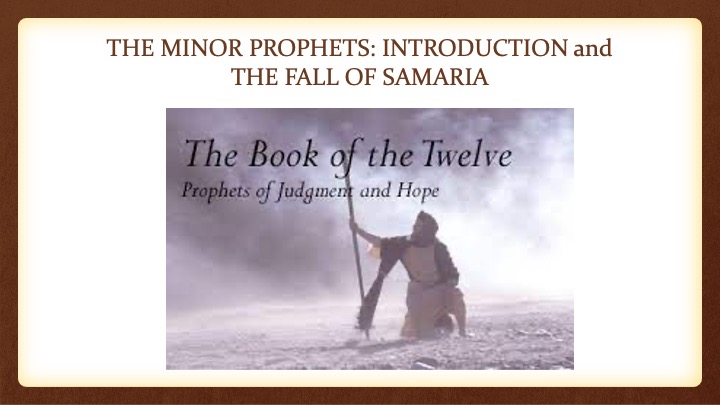
THE TWELVE MINOR PROPHETS:
INTRODUCTION and THE FALL OF SAMARIA
THE BOOK OF THE TWELVE MINOR PROPHETS
Prophets of Judgement and Hope
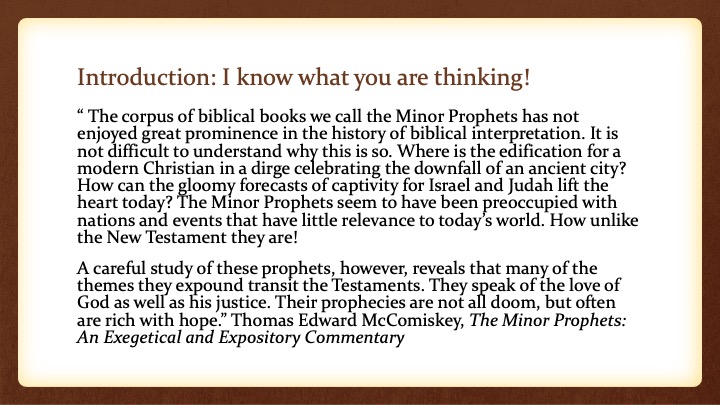
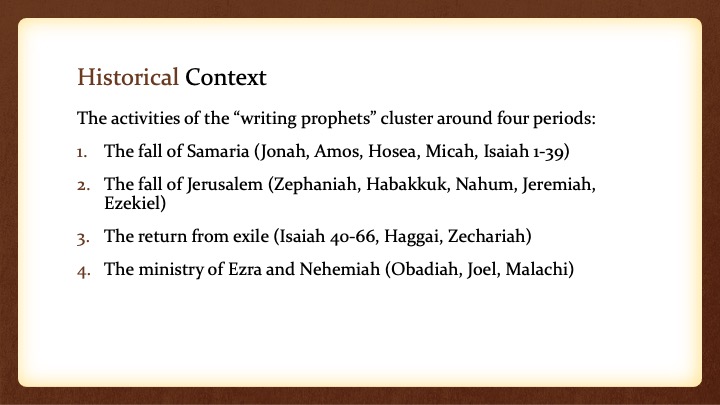
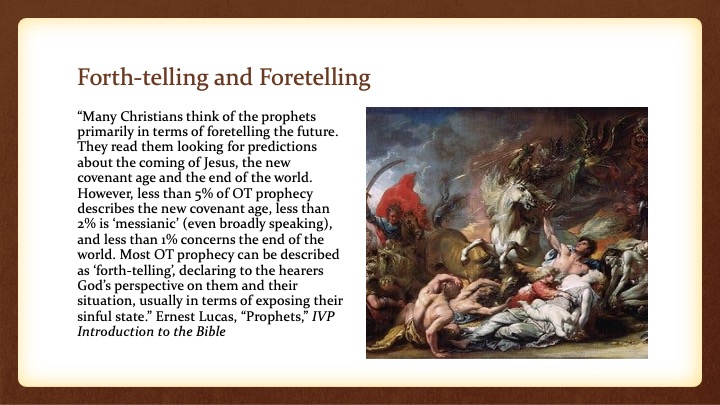
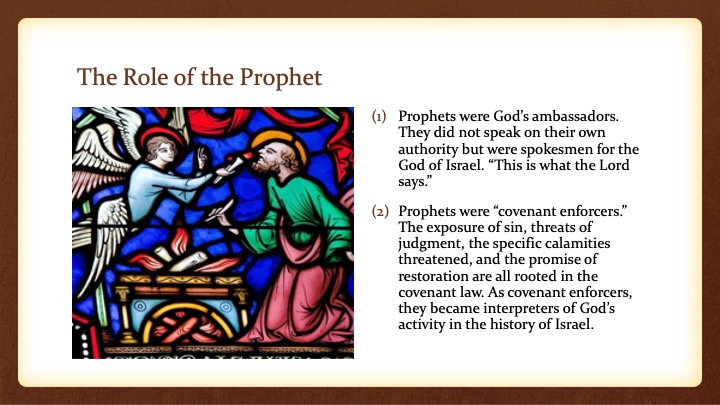
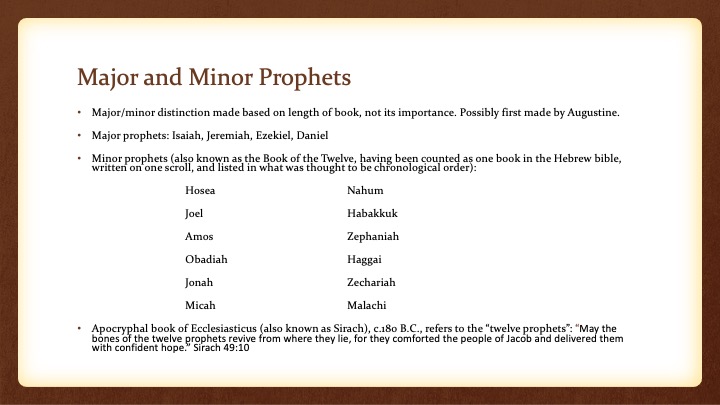
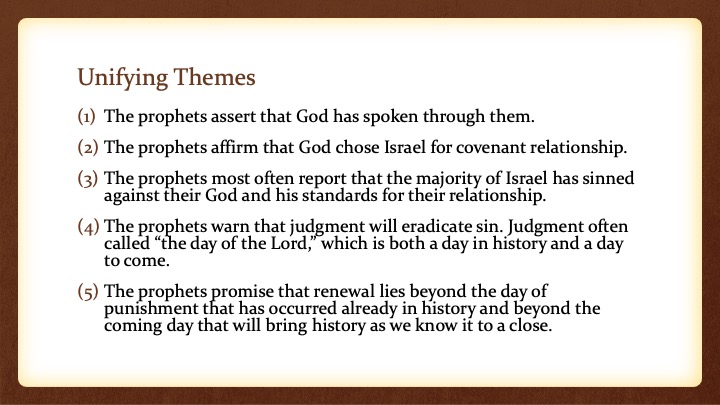
The Twelve Minor Prophets - Jonah
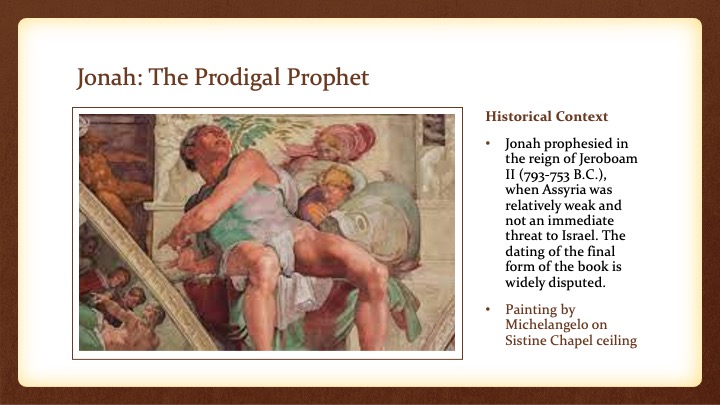
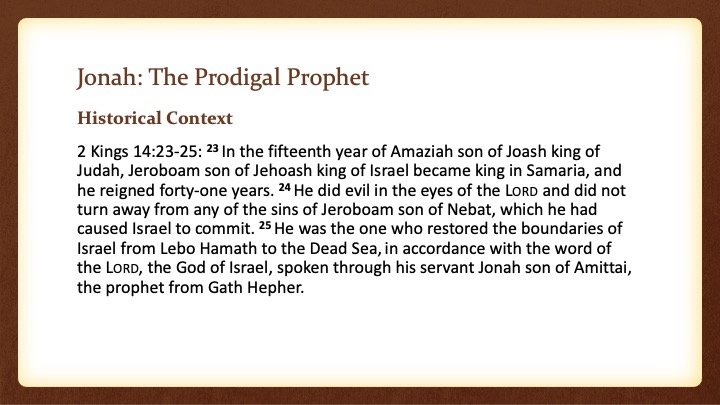
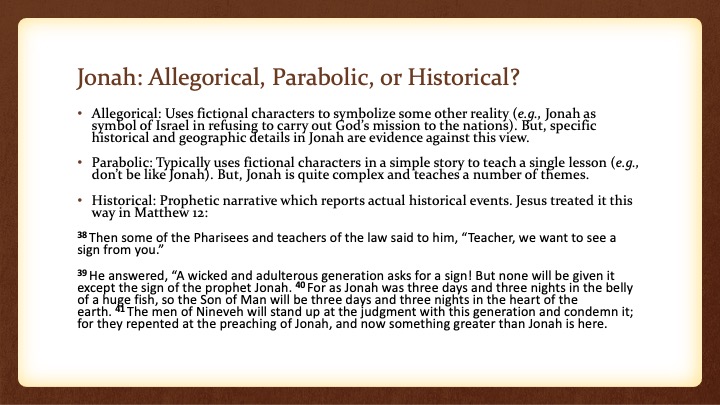
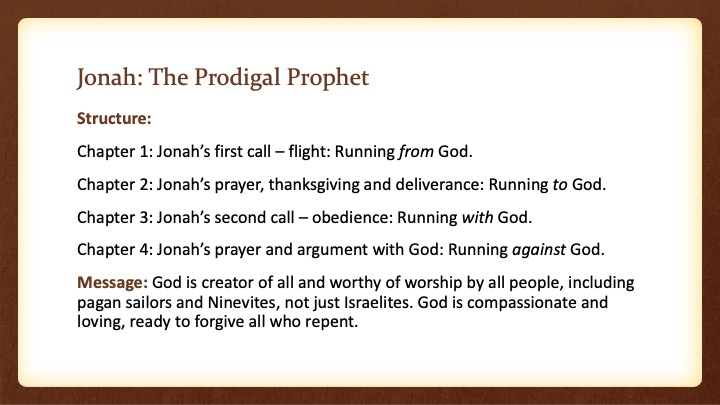
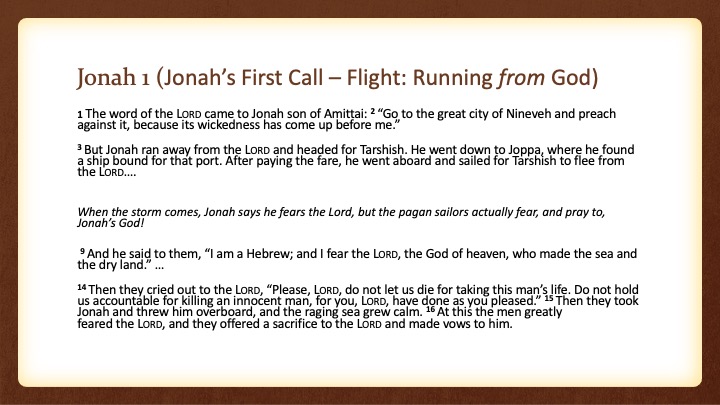
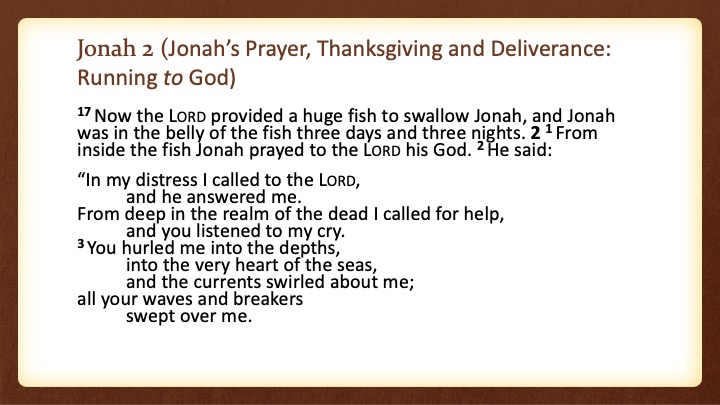
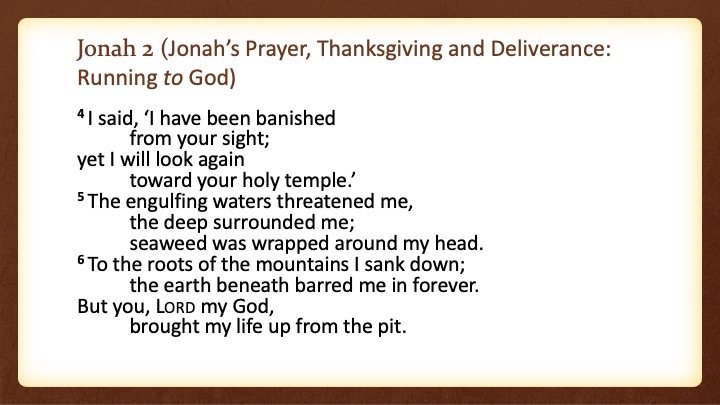
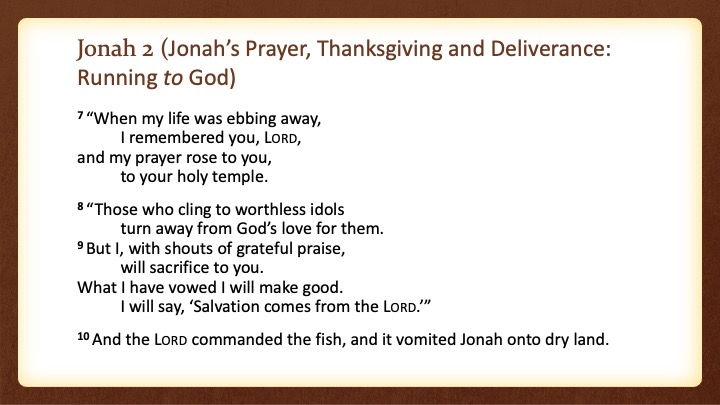
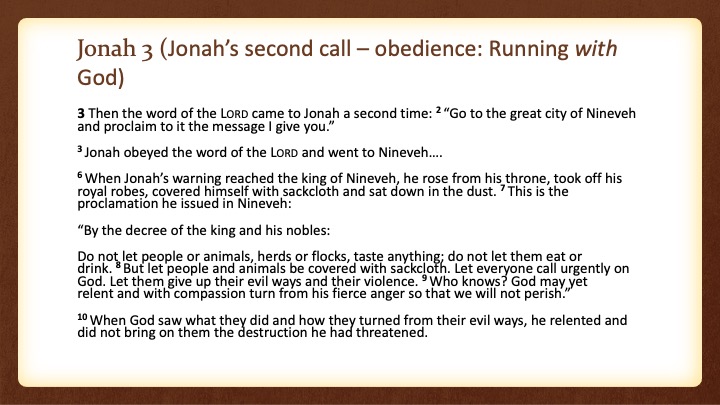
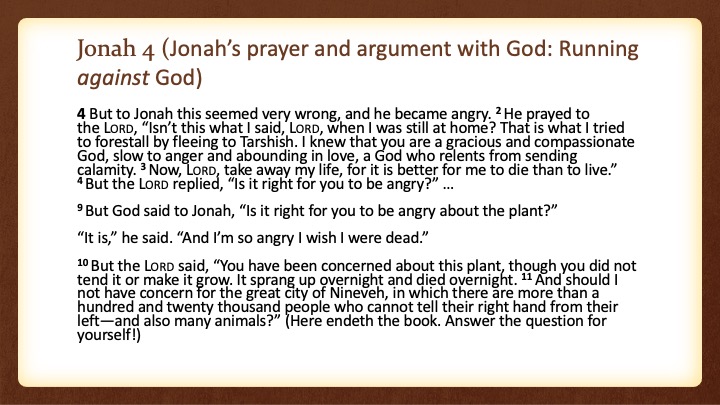
The Twelve Minor Prophets - Amos
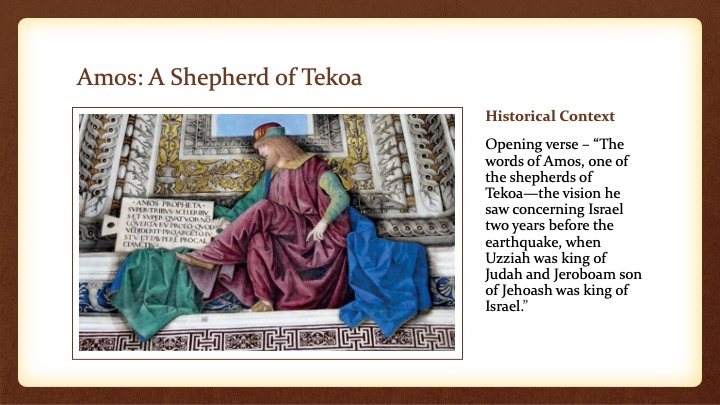
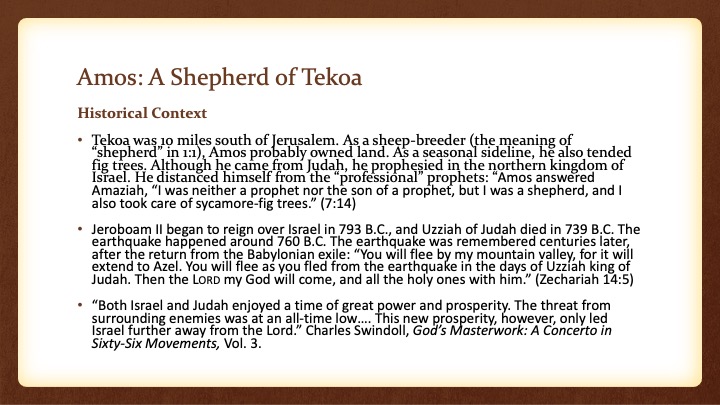
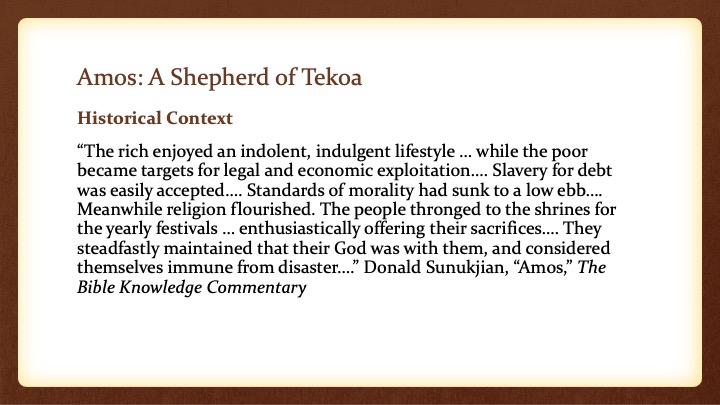
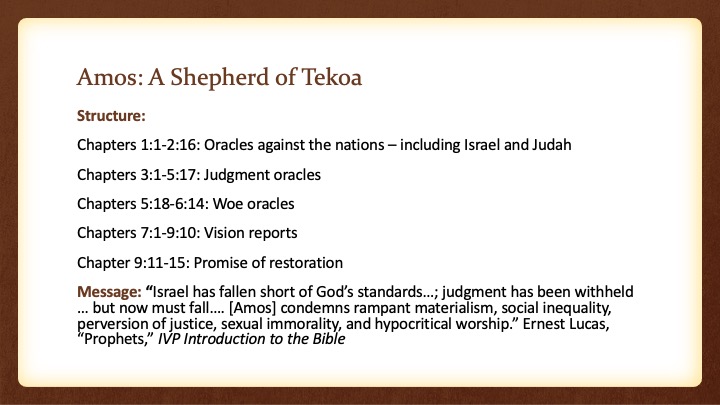
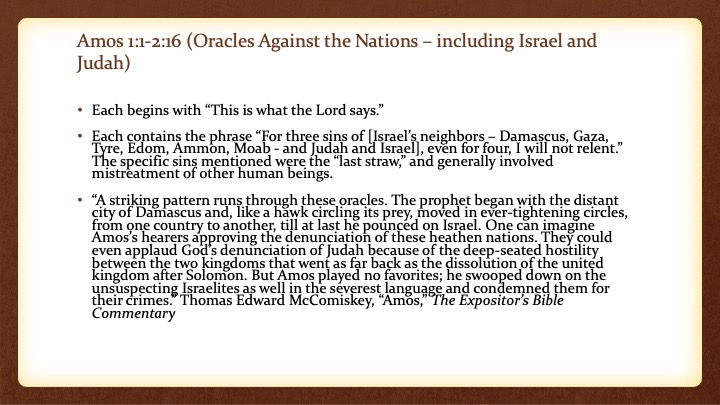
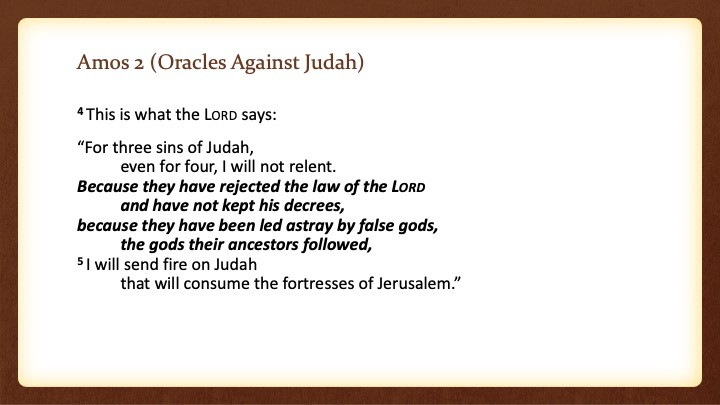
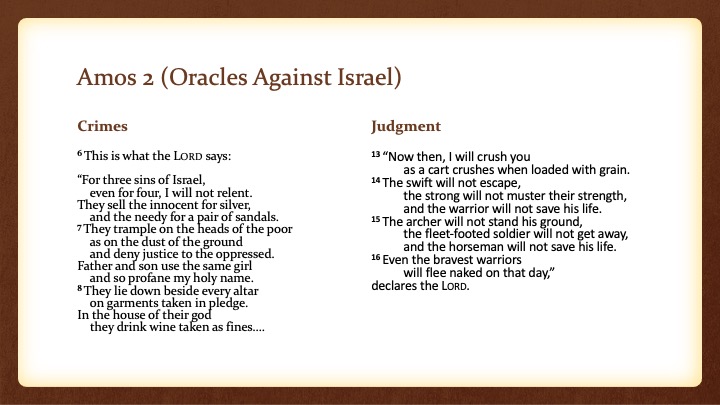
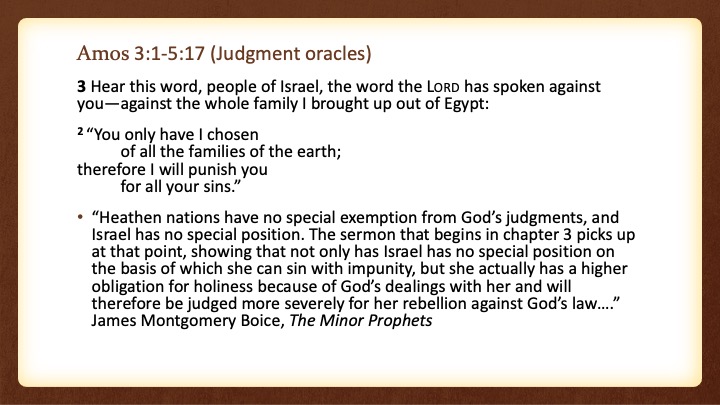
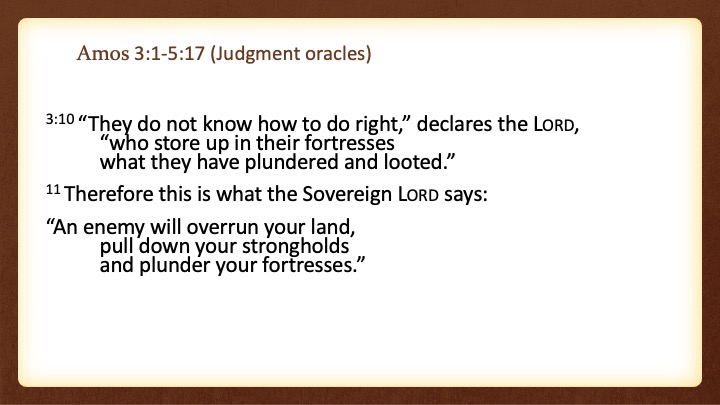
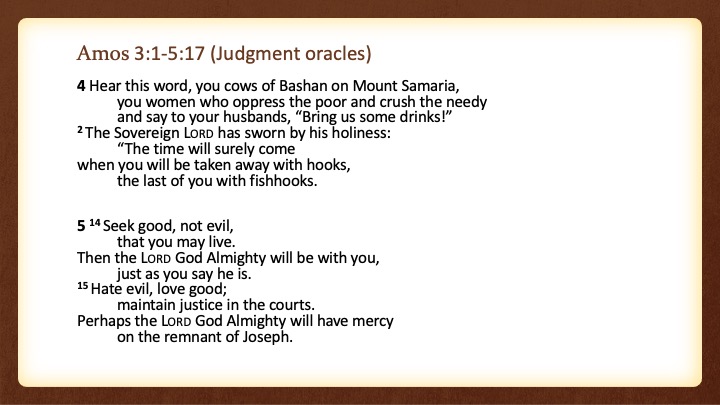
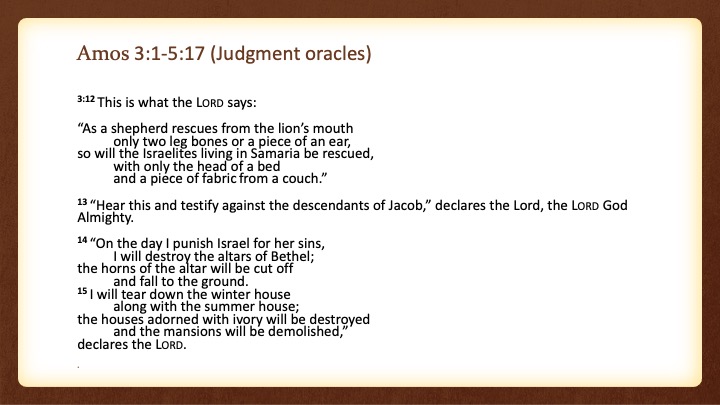
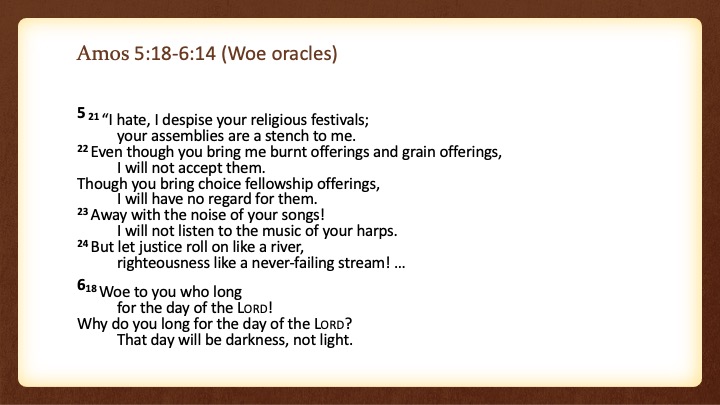
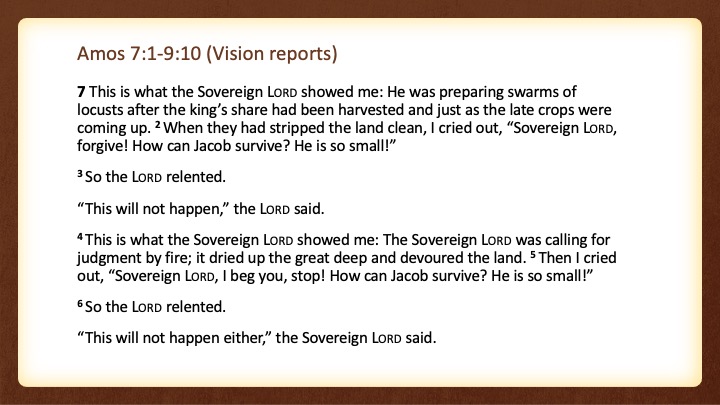
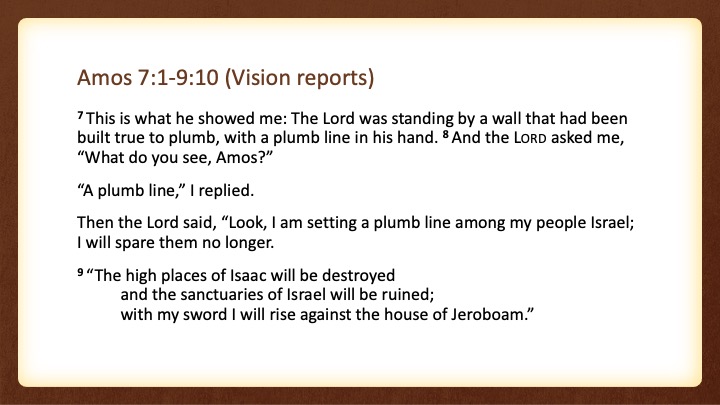
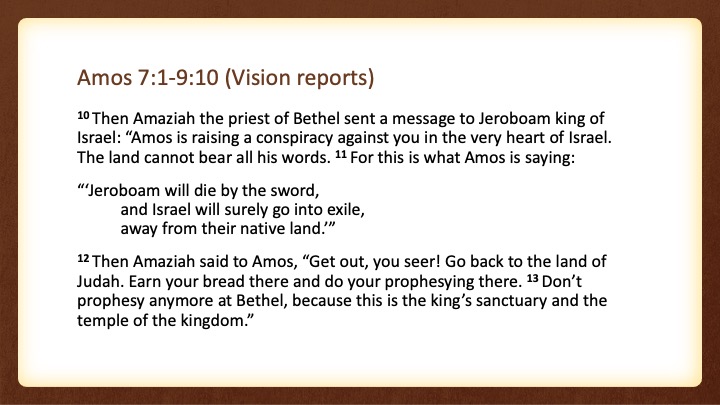
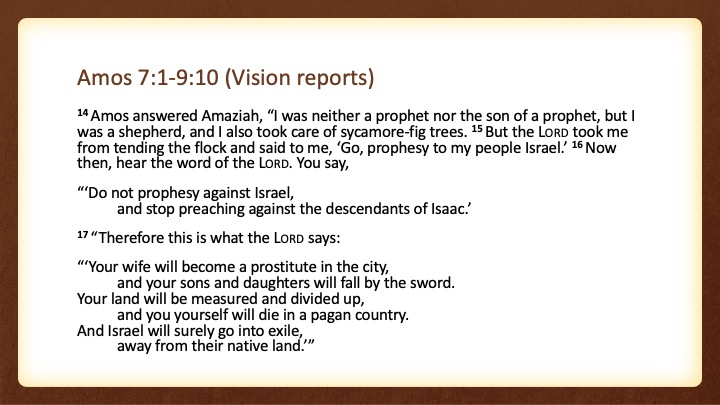
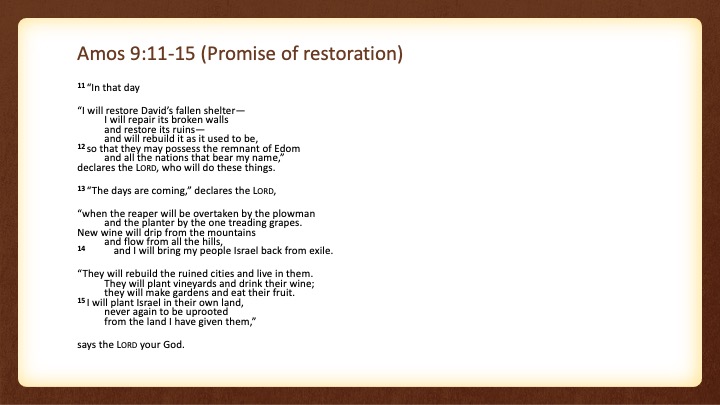
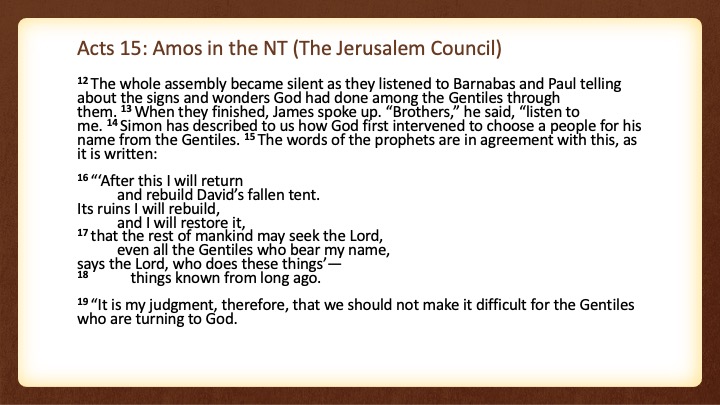
The Twelve Minor Prophets - The Text
Introduction: I know what you are thinking!
“ The corpus of biblical books we call the Twelve Minor Prophets has not enjoyed great prominence in the history of biblical interpretation. It is not difficult to understand why this is so. Where is the edification for a modern Christian in a dirge celebrating the downfall of an ancient city? How can the gloomy forecasts of captivity for Israel and Judah lift the heart today? The Twelve Minor Prophets seem to have been preoccupied with nations and events that have little relevance to today’s world. How unlike the New Testament they are!
A careful study of these prophets, however, reveals that many of the themes they expound transit the Testaments. They speak of the love of God as well as his justice. Their prophecies are not all doom, but often are rich with hope.” Thomas Edward McComiskey, The Minor Prophets: An Exegetical and Expository Commentary
Historical Context
The activities of the “writing prophets” cluster around four periods:
The fall of Samaria (Jonah, Amos, Hosea, Micah, Isaiah 1-39)
The fall of Jerusalem (Zephaniah, Habakkuk, Nahum, Jeremiah, Ezekiel)
The return from exile (Isaiah 40-66, Haggai, Zechariah)
The ministry of Ezra and Nehemiah (Obadiah, Joel, Malachi)
Forth-telling and Foretelling
“Many Christians think of the prophets primarily in terms of foretelling the future. They read them looking for predictions about the coming of Jesus, the new covenant age and the end of the world. However, less than 5% of OT prophecy describes the new covenant age, less than 2% is ‘messianic’ (even broadly speaking), and less than 1% concerns the end of the world. Most OT prophecy can be described as ‘forth-telling’, declaring to the hearers God’s perspective on them and their situation, usually in terms of exposing their sinful state.” Ernest Lucas, “Prophets,” IVP Introduction to the Bible
The Role of the Prophet
Prophets were God’s ambassadors. They did not speak on their own authority but were spokesmen for the God of Israel. “This is what the Lord says.”
Prophets were “covenant enforcers.” The exposure of sin, threats of judgment, the specific calamities threatened, and the promise of restoration are all rooted in the covenant law. As covenant enforcers, they became interpreters of God’s activity in the history of Israel.
Major and Minor Prophets
Major/minor distinction is made based on the length of book, not its importance. Possibly first made by Augustine.
Major prophets: Isaiah, Jeremiah, Ezekiel, Daniel
The Twelve Minor Prophets (also known as the Book of the Twelve, having been counted as one book in the Hebrew bible, written on one scroll, and listed in what was thought to be chronological order):
Hosea Nahum
Joel Habakkuk
Amos Zephaniah
Obadiah Haggai
Jonah Zechariah
Micah Malachi
Apocryphal book of Ecclesiasticus (also known as Sirach), c.180 B.C., refers to the “twelve minor prophets”: “May the bones of the twelve prophets revive from where they lie, for they comforted the people of Jacob and delivered them with confident hope.” Sirach 49:10
Unifying Themes
The prophets assert that God has spoken through them.
The prophets affirm that God chose Israel for covenant relationship.
The prophets most often report that the majority of Israel has sinned against their God and his standards for their relationship.
The prophets warn that judgment will eradicate sin. Judgment often called “the day of the Lord,” which is both a day in history and a day to come.
The prophets promise that renewal lies beyond the day of punishment that has occurred already in history and beyond the coming day that will bring history as we know it to a close.
The Twelve Minor Prophets - Jonah
Jonah: The Prodigal Prophet
Historical Context
Jonah prophesied in the reign of Jeroboam II (793-753 B.C.), when Assyria was relatively weak and not an immediate threat to Israel. The dating of the final form of the book is widely disputed.
Painting by Michelangelo on Sistine Chapel ceiling
Jonah: The Prodigal Prophet
Historical Context
2 Kings 14:23-25: 23 In the fifteenth year of Amaziah son of Joash king of Judah, Jeroboam son of Jehoash king of Israel became king in Samaria, and he reigned forty-one years. 24 He did evil in the eyes of the Lord and did not turn away from any of the sins of Jeroboam son of Nebat, which he had caused Israel to commit. 25 He was the one who restored the boundaries of Israel from Lebo Hamath to the Dead Sea, in accordance with the word of the Lord, the God of Israel, spoken through his servant Jonah son of Amittai, the prophet from Gath Hepher.
Jonah: Allegorical, Parabolic, or Historical?
Allegorical: Uses fictional characters to symbolize some other reality (e.g., Jonah as symbol of Israel in refusing to carry out God’s mission to the nations). But, specific historical and geographic details in Jonah are evidence against this view.
Parabolic: Typically uses fictional characters in a simple story to teach a single lesson (e.g., don’t be like Jonah). But, Jonah is quite complex and teaches a number of themes.
Historical: Prophetic narrative which reports actual historical events. Jesus treated it this way in Matthew 12:
38 Then some of the Pharisees and teachers of the law said to him, “Teacher, we want to see a sign from you.”
39 He answered, “A wicked and adulterous generation asks for a sign! But none will be given it except the sign of the prophet Jonah. 40 For as Jonah was three days and three nights in the belly of a huge fish, so the Son of Man will be three days and three nights in the heart of the earth. 41 The men of Nineveh will stand up at the judgment with this generation and condemn it; for they repented at the preaching of Jonah, and now something greater than Jonah is here.
Jonah: The Prodigal Prophet
Structure:
Chapter 1: Jonah’s first call – flight: Running from God.
Chapter 2: Jonah’s prayer, thanksgiving and deliverance: Running to God.
Chapter 3: Jonah’s second call – obedience: Running with God.
Chapter 4: Jonah’s prayer and argument with God: Running against God.
Message: God is creator of all and worthy of worship by all people, including pagan sailors and Ninevites, not just Israelites. God is compassionate and loving, ready to forgive all who repent.
Jonah 1 (Jonah’s First Call – Flight: Running from God)
1 The word of the Lord came to Jonah son of Amittai: 2 “Go to the great city of Nineveh and preach against it, because its wickedness has come up before me.”
3 But Jonah ran away from the Lord and headed for Tarshish. He went down to Joppa, where he found a ship bound for that port. After paying the fare, he went aboard and sailed for Tarshish to flee from the Lord….
When the storm comes, Jonah says he fears the Lord, but the pagan sailors actually fear, and pray to, Jonah’s God!
9 And he said to them, “I am a Hebrew; and I fear the Lord, the God of heaven, who made the sea and the dry land.” …
14 Then they cried out to the Lord, “Please, Lord, do not let us die for taking this man’s life. Do not hold us accountable for killing an innocent man, for you, Lord, have done as you pleased.” 15 Then they took Jonah and threw him overboard, and the raging sea grew calm. 16 At this the men greatly feared the Lord, and they offered a sacrifice to the Lord and made vows to him.
Jonah 2 (Jonah’s Prayer, Thanksgiving and Deliverance: Running to God)
17 Now the Lord provided a huge fish to swallow Jonah, and Jonah was in the belly of the fish three days and three nights. 2 1 From inside the fish Jonah prayed to the Lord his God. 2 He said:
“In my distress I called to the Lord, and he answered me.From deep in the realm of the dead I called for help, and you listened to my cry. 3 You hurled me into the depths, into the very heart of the seas, and the currents swirled about me; all your waves and breakers swept over me.
Jonah 2 (Jonah’s Prayer, Thanksgiving and Deliverance: Running to God)
4 I said, ‘I have been banished from your sight; yet I will look again toward your holy temple.’ 5 The engulfing waters threatened me, the deep surrounded me; seaweed was wrapped around my head. 6 To the roots of the mountains I sank down; the earth beneath barred me in forever. But you, Lord my God, brought my life up from the pit.
Jonah 2 (Jonah’s Prayer, Thanksgiving and Deliverance: Running to God)
7 “When my life was ebbing away, I remembered you, Lord, and my prayer rose to you, to your holy temple.
8 “Those who cling to worthless idols turn away from God’s love for them. 9 But I, with shouts of grateful praise, will sacrifice to you. What I have vowed I will make good.I will say, ‘Salvation comes from the Lord.’”
10 And the Lord commanded the fish, and it vomited Jonah onto dry land.
Jonah 3 (Jonah’s second call – obedience: Running with God)
3 Then the word of the Lord came to Jonah a second time: 2 “Go to the great city of Nineveh and proclaim to it the message I give you.”
3 Jonah obeyed the word of the Lord and went to Nineveh….
6 When Jonah’s warning reached the king of Nineveh, he rose from his throne, took off his royal robes, covered himself with sackcloth and sat down in the dust. 7 This is the proclamation he issued in Nineveh:
“By the decree of the king and his nobles:
Do not let people or animals, herds or flocks, taste anything; do not let them eat or drink. 8 But let people and animals be covered with sackcloth. Let everyone call urgently on God. Let them give up their evil ways and their violence. 9 Who knows? God may yet relent and with compassion turn from his fierce anger so that we will not perish.”
10 When God saw what they did and how they turned from their evil ways, he relented and did not bring on them the destruction he had threatened.
Jonah 4 (Jonah’s prayer and argument with God: Running against God)
4 But to Jonah this seemed very wrong, and he became angry. 2 He prayed to the Lord, “Isn’t this what I said, Lord, when I was still at home? That is what I tried to forestall by fleeing to Tarshish. I knew that you are a gracious and compassionate God, slow to anger and abounding in love, a God who relents from sending calamity. 3 Now, Lord, take away my life, for it is better for me to die than to live.” 4 But the Lord replied, “Is it right for you to be angry?” …
9 But God said to Jonah, “Is it right for you to be angry about the plant?”
“It is,” he said. “And I’m so angry I wish I were dead.”
10 But the Lord said, “You have been concerned about this plant, though you did not tend it or make it grow. It sprang up overnight and died overnight. 11 And should I not have concern for the great city of Nineveh, in which there are more than a hundred and twenty thousand people who cannot tell their right hand from their left—and also many animals?” (Here endeth the book. Answer the question for yourself!)
The Twelve Minor Prophets - Amos
Amos: A Shepherd of Tekoa
Historical Context
Opening verse – “The words of Amos, one of the shepherds of Tekoa - the vision he saw concerning Israel two years before the earthquake, when Uzziah was king of Judah and Jeroboam son of Jehoash was king of Israel.”
Amos: A Shepherd of Tekoa
Historical Context
Tekoa was 10 miles south of Jerusalem. As a sheep-breeder (the meaning of “shepherd” in 1:1), Amos probably owned land. As a seasonal sideline, he also tended fig trees. Although he came from Judah, he prophesied in the northern kingdom of Israel. He distanced himself from the “professional” prophets: “Amos answered Amaziah, “I was neither a prophet nor the son of a prophet, but I was a shepherd, and I also took care of sycamore-fig trees.” (7:14)
Jeroboam II began to reign over Israel in 793 B.C., and Uzziah of Judah died in 739 B.C. The earthquake happened around 760 B.C. The earthquake was remembered centuries later, after the return from the Babylonian exile: “You will flee by my mountain valley, for it will extend to Azel. You will flee as you fled from the earthquake in the days of Uzziah king of Judah. Then the Lord my God will come, and all the holy ones with him.” (Zechariah 14:5)
“Both Israel and Judah enjoyed a time of great power and prosperity. The threat from surrounding enemies was at an all-time low…. This new prosperity, however, only led Israel further away from the Lord.” Charles Swindoll, God’s Masterwork: A Concerto in Sixty-Six Movements, Vol. 3.
Amos: A Shepherd of Tekoa
Historical Context
“The rich enjoyed an indolent, indulgent lifestyle … while the poor became targets for legal and economic exploitation…. Slavery for debt was easily accepted…. Standards of morality had sunk to a low ebb…. Meanwhile religion flourished. The people thronged to the shrines for the yearly festivals … enthusiastically offering their sacrifices…. They steadfastly maintained that their God was with them, and considered themselves immune from disaster….” Donald Sunukjian, “Amos,” The Bible Knowledge Commentary
Amos: A Shepherd of Tekoa
Structure:
Chapters 1:1-2:16: Oracles against the nations – including Israel and Judah
Chapters 3:1-5:17: Judgment oracles
Chapters 5:18-6:14: Woe oracles
Chapters 7:1-9:10: Vision reports
Chapter 9:11-15: Promise of restoration
Message: “Israel has fallen short of God’s standards…; judgment has been withheld … but now must fall…. [Amos] condemns rampant materialism, social inequality, perversion of justice, sexual immorality, and hypocritical worship.” Ernest Lucas, “Prophets,” IVP Introduction to the Bible
Amos 1:1-2:16 (Oracles Against the Nations – including Israel and Judah)
Each begins with “This is what the Lord says.”
Each contains the phrase “For three sins of [Israel’s neighbors – Damascus, Gaza, Tyre, Edom, Ammon, Moab - and Judah and Israel], even for four, I will not relent.” The specific sins mentioned were the “last straw,” and generally involved mistreatment of other human beings.
“A striking pattern runs through these oracles. The prophet began with the distant city of Damascus and, like a hawk circling its prey, moved in ever-tightening circles, from one country to another, till at last he pounced on Israel. One can imagine Amos’s hearers approving the denunciation of these heathen nations. They could even applaud God’s denunciation of Judah because of the deep-seated hostility between the two kingdoms that went as far back as the dissolution of the united kingdom after Solomon. But Amos played no favorites; he swooped down on the unsuspecting Israelites as well in the severest language and condemned them for their crimes.” Thomas Edward McComiskey, “Amos,” The Expositor’s Bible Commentary
Amos 2 (Oracles Against Judah) Amos 2 (Oracles Against Judah)
4 This is what the Lord says:
“For three sins of Judah, even for four, I will not relent. Because they have rejected the law of the Lord and have not kept his decrees, because they have been led astray by false gods, the gods their ancestors followed, 5 I will send fire on Judah that will consume the fortresses of Jerusalem.”
Amos 2 (Oracles Against Israel)
Crimes
6 This is what the Lord says:
“For three sins of Israel, even for four, I will not relent.They sell the innocent for silver, and the needy for a pair of sandals.7 They trample on the heads of the poor as on the dust of the ground and deny justice to the oppressed. Father and son use the same girl and so profane my holy name. 8 They lie down beside every altar on garments taken in pledge. In the house of their god they drink wine taken as fines….
Judgment
13 “Now then, I will crush you as a cart crushes when loaded with grain. 14 The swift will not escape, the strong will not muster their strength, and the warrior will not save his life. 15 The archer will not stand his ground, the fleet-footed soldier will not get away, and the horseman will not save his life. 16 Even the bravest warriors will flee naked on that day,”declares the Lord.
Amos 3:1-5:17 (Judgment oracles)
3 Hear this word, people of Israel, the word the Lord has spoken against you - against the whole family I brought up out of Egypt:
2 “You only have I chosenof all the families of the earth; therefore I will punish you for all your sins.”
“Heathen nations have no special exemption from God’s judgments, and Israel has no special position. The sermon that begins in chapter 3 picks up at that point, showing that not only has Israel has no special position on the basis of which she can sin with impunity, but she actually has a higher obligation for holiness because of God’s dealings with her and will therefore be judged more severely for her rebellion against God’s law….” James Montgomery Boice, The Minor Prophets
Amos 3:1-5:17 (Judgment oracles)
3:10 “They do not know how to do right,” declares the Lord, “who store up in their fortresses what they have plundered and looted.”
11 Therefore this is what the Sovereign Lord says:
“An enemy will overrun your land, pull down your strongholds and plunder your fortresses.”
Amos 3:1-5:17 (Judgment oracles)
4 Hear this word, you cows of Bashan on Mount Samaria, you women who oppress the poor and crush the needy and say to your husbands, “Bring us some drinks!” 2 The Sovereign Lord has sworn by his holiness:“The time will surely come when you will be taken away with hooks, the last of you with fishhooks.
5 14 Seek good, not evil, that you may live.Then the Lord God Almighty will be with you, just as you say he is.15 Hate evil, love good; maintain justice in the courts.Perhaps the Lord God Almighty will have mercyon the remnant of Joseph.
Amos 3:1-5:17 (Judgment oracles)
3:12 This is what the Lord says:
“As a shepherd rescues from the lion’s mouth only two leg bones or a piece of an ear, so will the Israelites living in Samaria be rescued, with only the head of a bed and a piece of fabric from a couch.”
13 “Hear this and testify against the descendants of Jacob,” declares the Lord, the Lord God Almighty.
14 “On the day I punish Israel for her sins, I will destroy the altars of Bethel; the horns of the altar will be cut off and fall to the ground.15 I will tear down the winter house along with the summer house; the houses adorned with ivory will be destroyed and the mansions will be demolished,” declares the Lord.
Amos 5:18 - 6:14 (Woe oracles)
5: 21 “I hate, I despise your religious festivals; your assemblies are a stench to me. 22 Even though you bring me burnt offerings and grain offerings, I will not accept them.Though you bring choice fellowship offerings,I will have no regard for them. 23 Away with the noise of your songs! I will not listen to the music of your harps. 24 But let justice roll on like a river, righteousness like a never-failing stream! …
618 Woe to you who longfor the day of the Lord!Why do you long for the day of the Lord? That day will be darkness, not light.
Amos 7:1-9:10 (Vision reports)
7 This is what the Sovereign Lord showed me: He was preparing swarms of locusts after the king’s share had been harvested and just as the late crops were coming up. 2 When they had stripped the land clean, I cried out, “Sovereign Lord, forgive! How can Jacob survive? He is so small!”
3 So the Lord relented.
“This will not happen,” the Lord said.
4 This is what the Sovereign Lord showed me: The Sovereign Lord was calling for judgment by fire; it dried up the great deep and devoured the land. 5 Then I cried out, “Sovereign Lord, I beg you, stop! How can Jacob survive? He is so small!”
6 So the Lord relented.
“This will not happen either,” the Sovereign Lord said.
Amos 7:1-9:10 (Vision reports)
7 This is what he showed me: The Lord was standing by a wall that had been built true to plumb, with a plumb line in his hand. 8 And the Lord asked me, “What do you see, Amos?”
“A plumb line,” I replied.
Then the Lord said, “Look, I am setting a plumb line among my people Israel; I will spare them no longer.
9 “The high places of Isaac will be destroyed and the sanctuaries of Israel will be ruined; with my sword I will rise against the house of Jeroboam.”
Amos 7:1-9:10 (Vision reports)
10 Then Amaziah the priest of Bethel sent a message to Jeroboam king of Israel: “Amos is raising a conspiracy against you in the very heart of Israel. The land cannot bear all his words. 11 For this is what Amos is saying:
“‘Jeroboam will die by the sword,and Israel will surely go into exile,away from their native land.’”
12 Then Amaziah said to Amos, “Get out, you seer! Go back to the land of Judah. Earn your bread there and do your prophesying there. 13 Don’t prophesy anymore at Bethel, because this is the king’s sanctuary and the temple of the kingdom.”
And note that Amaziah said "this is the king's sanctuary" - not "the Lord's sanctuary".
Amos 7:1-9:10 (Vision reports)
14 Amos answered Amaziah, “I was neither a prophet nor the son of a prophet, but I was a shepherd, and I also took care of sycamore-fig trees. 15 But the Lord took me from tending the flock and said to me, ‘Go, prophesy to my people Israel.’ 16 Now then, hear the word of the Lord. You say,
“‘Do not prophesy against Israel, and stop preaching against the descendants of Isaac.’
17 “Therefore this is what the Lord says:
“‘Your wife will become a prostitute in the city, and your sons and daughters will fall by the sword.Your land will be measured and divided up, and you yourself will die in a pagan country.And Israel will surely go into exile, away from their native land.’”
Amos 9:11-15 (Promise of restoration)
11 “In that day “I will restore David’s fallen shelter - I will repair its broken walls and restore its ruins - and will rebuild it as it used to be, 12 so that they may possess the remnant of Edom and all the nations that bear my name,”declares the Lord, who will do these things.
13 “The days are coming,” declares the Lord, “when the reaper will be overtaken by the plowman and the planter by the one treading grapes.New wine will drip from the mountains and flow from all the hills, 14 and I will bring my people Israel back from exile.
“They will rebuild the ruined cities and live in them.They will plant vineyards and drink their wine; they will make gardens and eat their fruit.15 I will plant Israel in their own land, never again to be uprooted from the land I have given them,” says the Lord your God.
Acts 15: Amos in the NT (The Jerusalem Council)
12 The whole assembly became silent as they listened to Barnabas and Paul telling about the signs and wonders God had done among the Gentiles through them. 13 When they finished, James spoke up. “Brothers,” he said, “listen to me. 14 Simon has described to us how God first intervened to choose a people for his name from the Gentiles. 15 The words of the prophets are in agreement with this, as it is written:
16 “‘After this I will return and rebuild David’s fallen tent. It's ruins I will rebuild, and I will restore it, 17 that the rest of mankind may seek the Lord, even all the Gentiles who bear my name, says the Lord, who does these things’ 18 things known from long ago.
19 “It is my judgment, therefore, that we should not make it difficult for the Gentiles who are turning to God.